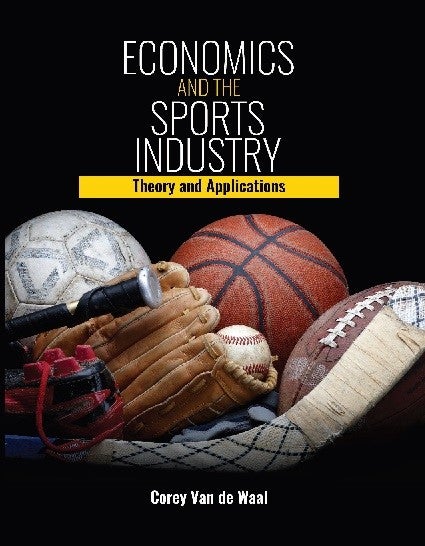Corey Van de Waal is a continuing lecturer in the Department of Economics. After developing and teaching ECON 254: The Economics of Sport for the past eight years, he's ventured in the publishing world with the release of Economics and the Sports Industry. It is available through Kendall Hunt Publishing Company.
Here is a short Q & A with Corey about the book.
Can you provide a bit of background about yourself and the areas of economics you focus on?
I come from a large Dutch Canadian family with roots in Southwestern Ontario. My research focus is primarily the economics of sport, but I have also published research on minimum wage and poverty.
What do you find interesting about the sports industry and why does it lend itself to studying economics?

The sports industry provides a workable context for teaching the core theories that students need for further study in economics. It also provides unique differences from other industries that allow the student to recognize that every industrial context is at least slightly differentiated.
As an instructor for core microeconomic theory classes throughout my teaching career, I have found that students respond favourably to examples and contexts that they can readily relate to.
For example, when I discuss the concept of comparative advantage, I use examples from my own life. Suppose that my wife and I have two tasks to complete in our household…doing the dishes and playing video games. I have a comparative advantage in playing video games and my wife has a comparative advantage in doing the dishes. Economic theory suggests that we can enhance our collective production if we specialize in the task in which we enjoy a comparative advantage and then trade with each other. Of course, this means that I should specialize in playing video games and my wife should specialize in doing the dishes. Now, I am an economist and my wife is not…so, I explain that we will be collectively more productive if we specialize and trade as I have described. When presented with this proposal, my wife rejected it enthusiastically. Even though it is a sub-optimal production plan, I still do the dishes…
My point is that students enjoy examples that they can relate to on a personal level. The sports industry provides a plethora of these examples that assist in understanding the underlying economic theory.
You have taught the Economics of Sport course for many years. How do your students respond to studying economics through the lens of the sports industry?
Over the years, the response to the course has been overwhelmingly positive. Sports have universal appeal. I think that is why we experience course enrolments from students in virtually every faculty, school, and department across the University of Waterloo. The opening paragraph or so of my new book provides some insight about the universal appeal of sport.
For many people

When we think of strong emotion we do not immediately think of economics (often referred to as ‘the dismal science’). Economic theory is built on the premise that individuals are rational, self-interested, and calculating. A significant part of our task when studying economic theory as it pertains to the sports industry is to reconcile cold, rational behaviour with the strong emotional influences that affect decision-makers.
How much inspiration did you get from your experience teaching undergraduates?
The inspiration for the new textbook originated from two equally important sources. The encouragement, support, and patience of my wife was paramount in inspiring me to tackle any task that I set out to complete. I was also equally motivated by my students and their interest in sports and economics. Over the years, many students commented that I should write a textbook that captured the more contemporary issues in the sports industry. As sports becomes more and more reliant on statistical analysis, the students wanted more analytics and contemporary topics like e-sport, sports betting, and fantasy sports. As a response to my students’ requests, the new textbook provides these topics and puts more emphasis on sports analytics than ever before.
Do you see yourself writing another book?
Writing a textbook is much more difficult than I imagined but it has also been more personally and professionally rewarding than I assumed it would be. If the right opportunity comes along then I would certainly consider writing another book.